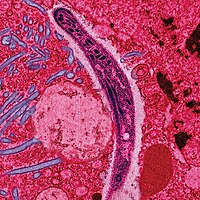
Photo from wikipedia
Malaria remains a major global health burden, causing over 247 million cases and 619,000 deaths in 2021 [1]. This disease is caused by eukaryotic, apicomplexan parasites in the species Plasmodium,… Click to show full abstract
Malaria remains a major global health burden, causing over 247 million cases and 619,000 deaths in 2021 [1]. This disease is caused by eukaryotic, apicomplexan parasites in the species Plasmodium, with the majority of cases caused by Plasmodium falciparum. With drug resistance on the rise, it is crucial to identify and exploit specific and essential features of the parasite. One of these differences is the temporally restricted expression of two types of ribosomal RNAs (rRNAs), the Asexual A-type and Sporozoite S-type. These rRNA types are conserved across Plasmodium species and have contributed to the reemerging acceptance that ribosomes are heterogeneous and can be specialized in their composition and function in eukaryotes [2,3].
Journal Title: PLOS Pathogens
Year Published: 2023
Link to full text (if available)
Share on Social Media: Sign Up to like & get
recommendations!